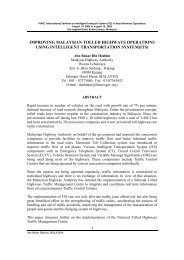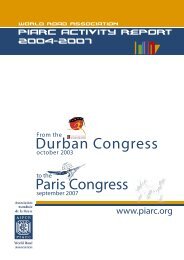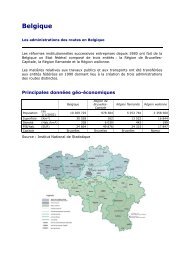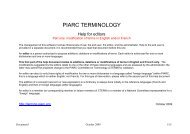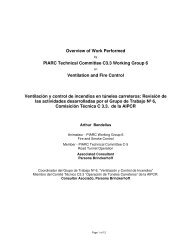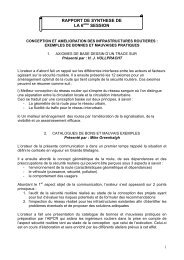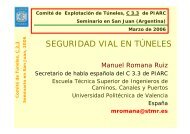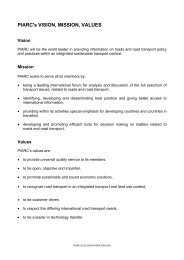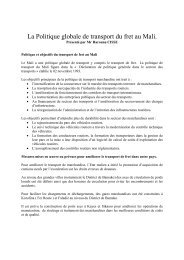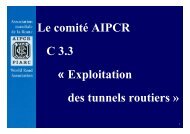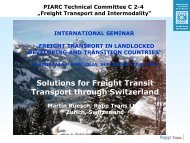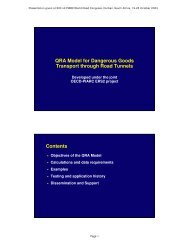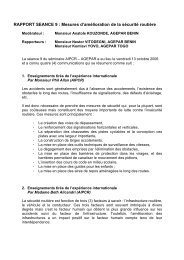General proceedings - Association mondiale de la Route
General proceedings - Association mondiale de la Route
General proceedings - Association mondiale de la Route
You also want an ePaper? Increase the reach of your titles
YUMPU automatically turns print PDFs into web optimized ePapers that Google loves.
• Results of the TC, P and FA be communicated in terms of loss of funds and in terms of<br />
poor workmanship.<br />
Title: Status of Road Sub-Sector Reforms in Sub-Saharan Africa<br />
Authors: Dr. Addo Abedi, Mr. O<strong>la</strong>v Elleveset, Mr. Mustapha Benmaamar<br />
Presenter: Dr. Addo Abedi (pictured), Chief Executive, TANROADS, Tanzania.<br />
The presenter highlighted that Road Transport is the<br />
dominant mo<strong>de</strong> in Sub-Sahara Africa (SSA) and<br />
typically carries over 75% of passenger and freight<br />
traffic. In some cases, it provi<strong>de</strong>s the only form of<br />
access especially to rural communities. By the end of<br />
the 1980s, SSA had over 2 million km of roads out of<br />
which about 600,000km were c<strong>la</strong>ssified as main roads.<br />
He further emphasized that the rep<strong>la</strong>cement value was<br />
estimated at over US$150 billion. In term of assets,<br />
roads are some of SSA’s <strong>la</strong>rgest. Despite the importance to economic growth and poverty<br />
reduction, roads were poorly managed and ina<strong>de</strong>quately maintained. The result was that by<br />
the early 90s most countries in SSA had more than 50% of their networks in poor condition.<br />
Transport costs were thus high through high vehicle operating costs. The road networks had<br />
therefore become bottlenecks to economic recovery programmes which most of these<br />
countries had embarked on. Dr Addo emphasized that there had to be reasons for Road Sub-<br />
Sector Reforms in Sub-Sahara Africa.<br />
Highlights of the Presentation:<br />
• To ultimately provi<strong>de</strong> the road user value for money through better management of<br />
resources.<br />
• To bring roads into the market p<strong>la</strong>ce and put them on a fee – for – service basis through<br />
appropriate cost recovery policies (commercialization).<br />
• Supported by appropriate legis<strong>la</strong>tion and administrative frameworks for sustainability.<br />
• To re<strong>de</strong>fine the role of the private sector in road <strong>de</strong>livery by increasing its role in the<br />
management of the sector to engen<strong>de</strong>r ownership.<br />
• To run as accountable commercial entities while parent Ministries would be responsible<br />
for policy and oversight i.e Eyes on – hands off.<br />
• Funding for road maintenance nee<strong>de</strong>d to be increased and predictable for effective<br />
p<strong>la</strong>nning.<br />
Recommendations:<br />
• Autonomy should be given to Agencies and Road funds for accountability and improved<br />
efficiency. This can be enhanced through the restructuring of ministries in parallel with<br />
the setting up of new road sector bodies.<br />
• Inflows to Funds should be ma<strong>de</strong> directly rather than through Ministries of Finance<br />
(MOFs.)<br />
• Collection Base for Funds should be wi<strong>de</strong>ned.<br />
• Agencies should <strong>de</strong>velop management systems for cost-effective use of avai<strong>la</strong>ble funds.<br />
15



